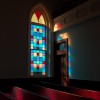
The Black Church has been getting ‘souls to the polls’ for more than 60 years
At Black churches up and down the U.S., religious slogans have been supplanted with another message in the run up to Nov. 3: Vote!

The Black Church has been getting ‘souls to the polls’ for more than 60 years
At Black churches up and down the U.S., religious slogans have been supplanted with another message in the run up to Nov. 3: Vote!
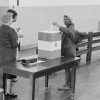
I vote because my father and grandfather couldn’t
Roland B. Smith Jr. is from Washington, D.C., whose residents weren’t allowed to vote in a presidential election until 1964. Growing up, his mother would travel almost 500 miles by bus or train from D.C. to Asheville, North Carolina, where she grew up, just to vote. Roland B. Smith Jr. always votes.
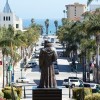
How to remove a statue rather than topple it
In the past four-plus months, many cities have been confronted with renewed outcries to remove offensive or ‘problem’ monuments that commemorate values of a bygone era. In some cases, these statues have been forcibly removed. In the latest essay in his ongoing series of stories about cities and why they are great, Bill Fulton revisits how Ventura, California, handled the controversy surrounding a statue of Father Junipero Serra.

It’s hard to breathe with a concrete plant in your backyard
NIMBY opposition alone isn’t enough to counter the harmful effects of air pollutants emitted by concrete batch plants located in underserved and over-polluted communities in Harris County, which is home to more of these facilities than any county in Texas. Too often, much of the pollution and many of the polluters largely go unchecked by the state.
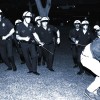
The City of Angels, the sins of the LAPD and the dos and don’ts of policing reform
Mayor Sylvester Turner’s Task Force on Policing Reform has started its work, drawing on a very broad set of local leaders, activists and citizens. A series of similar task forces were launched in Los Angeles in the 1990s, all of which arose from controversies and scandals within the LAPD. What can Houston learn from LA’s “blue ribbon” police task forces?
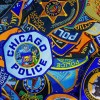
Many cities are rethinking the police, but what are the alternatives?
Investments, institutions and decriminalization all are strategies that can reduce the mandate of police and be more effective in addressing certain “offenses” than the criminal justice solution. This post explores police alternatives for cities, dividing them into three groups: health, relationships and community patrol.
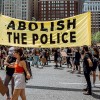
To better understand police culture, start here
While not all Americans support dismantling or defunding the police, recent surveys show the overwhelming majority do agree that changes in police training are needed. Most also think police officers shouldn’t be protected from being sued by “qualified immunity.” Part 2 of our reading list on policing brings together a collection of works on the culture within police organizations.
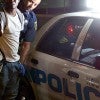
How did the flaws get into our flawed system of policing?
To better understand the ongoing problems with what police have done, we need to understand what it is that police do. The works included on this reading list examine police institutions in America and what members of this country’s many policing agencies actually do on a day-to-day basis.
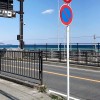
Why are Houston pedestrians forced to play a real-life game of ‘Frogger’?
Under Texas law, drivers are required to yield the right of way to people in a crosswalk, marked or unmarked. But for the most part, Houston drivers ignore the rules. In the end, the driving laws in the state are not protecting vulnerable road users.

As COVID-19 cases surge in Texas, July rent is due for many struggling to avoid eviction
Renters in Texas were some of the first in the nation to face evictions after the state’s moratorium blocking eviction proceedings expired last month. A U.S. Census Bureau survey finds that 33% of renter households in Texas have little or no confidence in their ability to pay rent for July.

Will the rush to reopen only end up intensifying the economic crisis?
Texas and other small-government Sun Belt states, which were already were limited in their capacity to respond in times of economic crisis, were hit hard by big drops in consumer spending resulting from the coronavirus pandemic. As the second part of the pandemic’s first wave now washes over many of these states, it remains to be seen what effect it will have on their floundering economies.
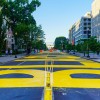
How the mayor of Washington D.C. used ‘graffiti’ to protect public space
Washington, D.C. Mayor Muriel Bowser ordered “BLACK LIVES MATTER” to be painted on a street near the White House. The act would have been considered vandalism had it not been done by city workers.
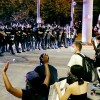
As other cities consider defunding police, Houston increases HPD’s budget
In the past 20 years, many social functions and gaps in city services have fallen to police departments, which, at the same time, have been acquiring more paramilitary equipment. Now, as cities face large budget deficits because of revenue losses from the COVID-19 pandemic and protestors call for defunding the police, it's yet to be seen how police services will be affected.
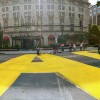
Protests, public space and the remaking of cities
Highways that divide neighborhoods, crumbling local streets, poorly maintained public spaces and proximity to unhealthy industrial sites — impact black and brown communities far more than wealthier, predominately white neighborhoods. These inherent inequalities in the nation’s infrastructure systems are problems that arise from decades of racial inequality and disinvestment.
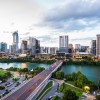
Large, young and fast-growing Sun Belt metros need urban policy innovation
Large cities of the Sun Belt are getting bigger and younger faster than metro areas in other parts of the country. They also face a combination of challenges unlike those metros in other regions; however, American urban policy as we know it was created for traditional Northeastern and Midwestern cities.
Rice University
Kraft Hall
6100 Main Street, Suite 305
Houston, TX 77005-1892